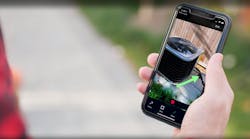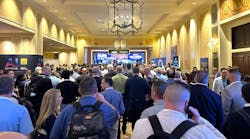MOSCOW (AP) - Russia's economic recovery may have played a bigger role than fear in doubling the number of visitors at an annual exhibition of security gizmos and gadgetry, but terrorism was on the lips of visitors and exhibitors alike.
The Security Technologies exhibition, which opened Tuesday and runs through Friday, was the first to be held in since two passenger planes blew up almost simultaneously on Aug. 24, killing 90 people and marking the start of the latest series of deadly terrorist attacks blamed on Chechen rebels.
Nearly 440 people died in the attacks, which included a terrifying school hostage-taking in the southern town of Beslan.
Fifty-thousand visitors were expected to attend this year's exhibition, twice the number as in 2003, according to Sergei Sharov, executive director of the show's organizer, Zashchita-Expo (Defense-Expo). While Sharov put the interest down entirely to Russia's oil-boosted economic recovery, exhibitors said they were tapping interest generated in the wake of the summer terror attacks.
"That's why we're here, and based upon the interest we received, it won't be the last time," said Steve Lancaster, vice president of the Dulles, Virginia-based Guardian Technologies, who was at the show to promote his plastic-explosive detecting software.
Lancaster said he hoped that - at a comparatively cheap US$40,000 a pop - the equipment would flesh out the simple X-ray hand-luggage scanners at Russia's infamously porous airport check-ins - and elsewhere.
"Even at this convention, all they have is magnetometers. Yesterday ... everyone was walking in, the systems were constantly going off and they didn't even stop anyone," Lancaster said.
One visitor, a man who said he works with a security company, agreed that Russia's booming economy was a factor in the increased interest but that the new prominence of terror risks had played at least an equal role.
"If there is a problem in the country then you start to feel it (all over the country), it's not just restricted to the regions," said the visitor, who gave his name as Gennady.
Fifteen-thousand square meters (18,000 square yards) of exhibition space was filled with everything from the staple security fare of closed-circuit monitoring screens to lie detectors and fire alarm systems for Russia's sprawling oil and gas companies.
Some visitors came with their own security in tow: A burly businessman in a dark fur jacket strolled the stalls flanked by two bodyguards in gray camouflage. Nearby, a Russian Orthodox priest in flowing black robes was being given a tour by an exhibition organizer.
Not all exhibits were immediately recognizable as security-related. Not far from a remote-controlled, unmanned surveillance helicopter displayed at the Federal Security Service's stall, one exhibitor was offering decorative samurai swords while another was selling cutlery sets.
Nikolai Slipchenko, general director of the Transcrypt company, said it made no difference to him whether potential customers were motivated by terror attacks or the bloody business vendettas for which Russia was renowned in the 1990s.
"Today the whole criminal and terrorist threat is divided purely on paper - but there's no difference," he said while fielding questions from a man in a pinstriped suit. The item that had caught the potential customers eye was Slipchenko's Anti-Sniper surveillance system, which can detect an assassin's rifle sights at a distance of over 1,000 meters (yards).
Not that the exhibition catered exclusively to outside threats.
"Anyone who comes to work at a company is a zone of risk for the employer," said Konstantin Petrovich, formerly employed at a police scientific research laboratory.
He now sells the Barier-14 and Kris lie detectors, which he helped design in the mid-1980s.
The equipment can be used to resolve office disputes, Petrovich boasted, and can reliably determine whether an employee is a drug addict or alcoholic or has stolen from the office.
"Customers are calling day and night," he said.

